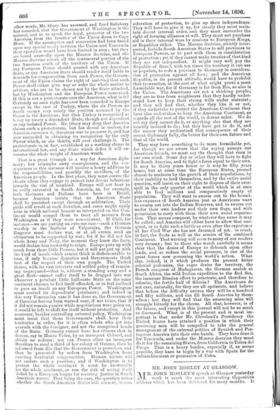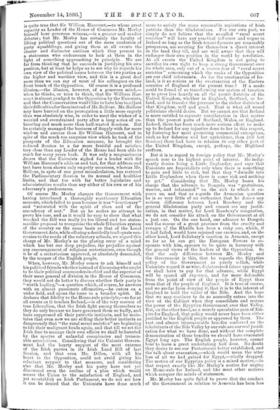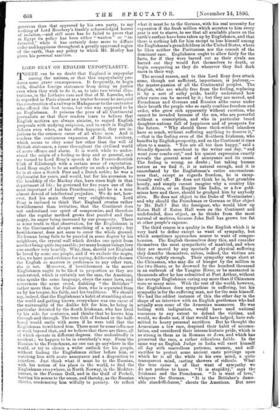MR JOHN MORLEY AT ,GLASGOW.
AT R. JOHN MORLEY'S speech at Glasgow yesterday _111 week is much the most interesting Opposition address which has been delivered for many months. It is quite true that Sir William Harcourt,—to whose great capacity as Leader of the House of Commons Mr. Morley himself bore generous witness,—is a greater and readier debater ; but Mr. Morley has certainly the faculty of lifting political questions out of the mere confusion of party squabblings, and giving them at all events the clearer and distincter outlines which they present to a statesman who endeavours to look at them in the light of something approaching to principle. We are far from thinking that he succeeds in justifying his own position, but at least he helps us to see why he regards his own view of the political issues between the two parties as the higher and worthier view, and this is a great deal more than we can say of most of his colleagues on the front bench of the Opposition. Of course it is a profound illusion,—the illusion, however, of a generous mind,— when he thinks, or tries to think, that Sir William liar.. court is almost grudged to the Opposition by the Unionists, and that the Conservatives would like to have him to adjust thei r difficulties for th em instead of Mr. Balfour. Mr. Balfour may have hurried on the prorogation a little more eagerly than was absolutely wise, in order to meet the wishes of a wearied and overstrained party after a long series of ex- hausting and much more than half-wasted Sessions. But he certainly managed the business of Supply with far more wisdom and success than Sir William Harcourt, and in spite of the much too sanguine view which he took of the prospects of the Education measure, he brought the reduced Session to a far more fruitful and satisfac- tory close than any Leader of the House had been able to reach for many years back. It was only a magnanimous dream that the Unionists sighed for a leader with Sir William Harcourt's address and tact, for that address and tact have been shown only on petty occasions, whereas Mr. Balfour, in spite of one great miscalculation, has restored the Parliamentary Session to its normal and healthier limits, and that too with far better legislative and administrative results than any either of his own or of his adversary's predecessors.
Of course Mr. Morley charges the Government with having introduced a thoroughly reactionary Education measure, which failed to pass because it was " reactionary " and "saturated with the spirit of class and of the ascendency of sect." But as he makes no attempt to prove his case, and as it would be easy to show that what wrecked the Bill was really its too liberal and too states- manlike proposal to reorganise the whole Education system of the country on the same basis as that of the Local Government Acts, while offering a decidedly inadequate con- cession to the needs of the voluntary schools, we regard this charge of Mr. Morley's as the glaring error of a mind which has but one deep prejudice, the prejudice against any encouragement of religious sectarianism, even though it be of a sectarianism approved, or absolutely demanded, by the temper of the English people.
When, however, Mr. Morley comes to ask himself and his political friends whether instead of discussingwho ought to be their political commander-in-chief and the superior of their mere general of division in the House of Commons, they would not do better to discuss whether their party is "worth leading,"—a question which, of course, he answers with an almost passionate affirmative,—he enters on a wider field, and opens the issue in a broader spirit. He declares that fidelity to the Home-rule principle,—so far at all events as it touches Ireland,—is of the very essence of true Liberalism, that the Irish fight among themselves as they do only because we have governed them so badly, and have suppressed all their patriotic instincts, and he main- tains that even now we are stifling their better instincts so dangerously that "the rural secret societies" are beginning to lift their malignant heads again, and that till we set the Irish free to manage their own affairs we shall be haunted by the spectre of unlawful conspiracies and treason- able associations. Considering that the Unionist Govern- ment had the hearty support of the most extreme of the Irish parties in its Irish Land Bill of last Session, and that even Mr. Dillon, with all his heart in the Opposition, could not avoid giving his reluctant support to that measure, and considering also that Mr. Morley and his party have not yet discovered even the outline of a plan which would secure the Union to the satisfaction of England, and yet re-establish an Irish Parliament, we do not see how it can be denied that the Unionists have done much more to satisfy the more reasonable aspirations of Irish patriots than the Gladstonians. For our own part, we simply do not believe that the so-called "rural secret societies" will have any practical influence and vogue in Ireland so long as the Irish tenant-farmers are reasonably prosperous, are securing for themselves a direct interest in the land they till, and are well aware that they will endanger their own position in the world by revolution. At all events the United Kingdom is not going to sacrifice its own right to keep a strong Government over its whole area, only out of a craven fear of "rural secret societies" concerning which the ranks of the Opposition are our chief informants. As for the overtaxation of Ire- land, is it so serious as the overtaxation of the Eastern counties of England at the present time ? If a mode could be found of so transforming our system of taxation as to press less heavily on all the poorer districts of the United Kingdom, whether in England, Scotland, or Ire- land, and to transfer the pressure to the richer districts of that Kingdom, well and good. That is what all sound politicians should desire. But we cannot see that Ireland is more entitled to separate consideration in that matter than the poorest parts of Scotland, Wales, or England. Indeed, there has been much more serious effort to make up to Ireland for any injustice done to her in this respect, by fostering her most promising commercial enterprises, such as her fisheries and her agriculture, than (till last Session) there had been in relation to any other part of the 'United Kingdom, except, perhaps, the Highland crofters.
But it is in regard to foreign policy that Mr. Morley's speech rose to its highest point of interest. He indig- nantly denies being a Little Englander, and says that Unionists are Imperialists only when there is something to gain and little to risk, but that they "dwindle into Little Englanders when there is some risk and nothing to get." Considering that Mr. Morley bases his charge that the advance to Dongola was "gratuitous wanton, and infatuated" on the risk to which it ex- poses us, and that as regards the Armenian question he is so very little of an enthusiast that he denies any serious difference between Lord Rosebery and the general Gladstonian party and cannot see any justifi- cation, in that matter, for Lord Rosebery's resignation, we do not consider his attack on the Government at all a just one. On the one hand, our advance to Dongola and the rescue of a great province from the cruelty and ravages o! the Khalifa has been a risky one, which, if it had failed, would have rejoiced our enemies, and, on the other hand, Lord Salisbury's inaction in Armenia, except so far as he can get the European Powers to co- operate with him, appears to be quite in harmony with the general views of the leaders of the Opposition. So that the only difference between Mr. Morley and the Government is this, that he regards the Egyptian policy of the Government as purely selfish, while Unionists regard it as wise, disinterested (since apparently we shall have to pay for that advance, while Egypt will be spared all expense), and far more defensible from the point of view of the people of Egypt than from that of the people of England. It is true of course, and we are far from denying it, that it is to the interest of England to hold the valley of the Nile. And the hope that we may continue to do so assuredly enters into the view of the Cabinet when they consolidate and restore the power of the Egyptian Government over that Valley. But, on the other hand, as a merely speculative gain of Em- pire for England, that policy would never have been either justified to the English people or approved by them. The vast and almost immeasurable benefits conferred on the inhabitants of the Nile Valley by our rule are our real justifi- cation for what we have done, and without the complete demonstration of those benefits we should have evacuated Egypt long ago. The English people, however, cannot bear to leave a great undertaking half done. No doubt they desire to see our Protectorate better established, and the talk about evacuation,—which would mean the utter loss of all we had gained for Egypt,—wholly dropped. The motive of our Egyptian policy is a mixed motive,—in that respect exactly like Mr. Morley's motive for urging on Home-rule for Ireland, and like most other motives which conquer the minds of statesmen.
Mr. Morley has quite failed to prove that the conduct of the Government in relation to Armenia has been less generous than that approved by his own party, to say nothing of Lord Rosebery's frankly acknowledged horror of isolation,—and still more has he failed to prove that in Egypt its policy has been either " wanton " or "in- fatuated," while it has certainly done more to diffuse order and happiness throughout a greatly oppressed region of the earth, than any policy to which Mr. Morley has given his personal sanction.








































 Previous page
Previous page